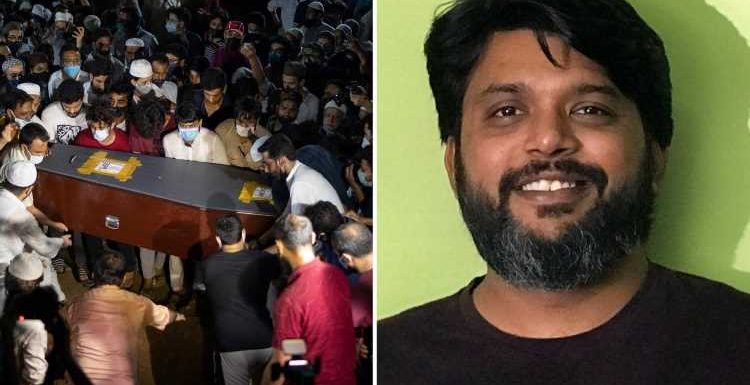
SHAMELESS Taliban fighters mutilated a Reuters photographer's face, leaving him "almost unrecognisable" after he was killed in Afghanistan.
Indian and Afghan officials said Danish Siddiqui's face was unrecognisable and that there were dozens of bullet holes in his body and tire marks on his face and chest.
Photos of his body taken shortly after the attack that claimed his life showed injuries but nowhere near the amount of damage officials saw when his remains was finally handed over to the Red Cross.
Taliban spokesperson Zabihullah Mujahid has denied any wrongdoing, according to the New York Times.
The India-born war correspondent was killed by Taliban gunfire while reporting on efforts by the Afghan Special Forces to retake the main market area of Spin Boldok, near the border with Pakistan.
His death was confirmed in a joint statement from Reuters president Michael Friedenberg and editor-in-chief Alessandra Galloni.
Siddiqui had recently reported on a mission by Afghan special forces to rescue a policeman who had been cut off from others and had fought the Taliban for hours on his own.
According to India's NDTV, Siddiqui was first wounded by shrapnel and taken to a nearby mosque to receive first aid.
Word of his stay spread, prompting Taliban fighters to attack the mosque and a local investigation to conclude the Taliban only attacked because they knew the photojournalist was hiding there, according to the Daily Mail.
RETURN OF TERROR
The terror group has seized a third of Afghanistan and show no sign of slowing down their blitz offensive.
The Taliban have been on tenterhooks to forge ahead with their scheme since President Joe Biden announced the withdrawal of troops back in April and have since continued at "lightning speed".
Jihadist forces have now advanced across rural areas, putting them in reaching distance of major cities such as Herat and Kabul.
A recent US intelligence report warned they could take the capital, Kabul, within six months.
They have now seized hold in almost twice as much of Afghanistan as they had three months ago – sparking concerns they are planning an explosive offensive this summer.
Fierce fighting has also been reported in and around the southern city of Kandahar, the capital of the province of the same name.
The Taliban have captured key districts near the city and engaged Afghan forces in a police district on the outskirts of the capital.
Over the past few days, Spin Boldak district has witnessed heavy fighting after the Taliban captured a key border crossing that links to Chaman in Pakistan’s Balochistan province.
The ruthless militants have already slaughtered dozens of civilians and vowed to crush gay men to death by pushing walls on them as they plot to reinstate their strict interpretation of Sharia law across war-torn Afghanistan.
A RESPECTED PHOTOGRAPHER
Siddiqui had worked for Reuters since 2010 and was part of the team to win the 2018 Pulitzer Prize for Feature Photography for documenting the Rohingya refugee crisis.
Siddiqui's work spanned covering the wars in Afghanistan and Iraq, the Rohingya refugees crisis, the Hong Kong protests and Nepal earthquakes.
Tributes have poured in for the Pulitzer-prize winning photojournalist.
Afghan ambassador Farid Mamundzay said in a tweet: “Deeply disturbed by the sad news of the killing of a friend, Danish Siddiqi in Kandahar last night.
"The Indian Journalist & winner of the Pulitzer Prize was embedded with Afghan security forces.
"I met him 2 weeks ago before his departure to Kabul. Condolences to his family & Reuters."
Meenakshi Ganguly, the South Asia director for Human Rights Watch, told the New York Times: "Danish always chose to be on the front lines so that abuses and atrocities could not remain hidden.
"The brutality with which Taliban fighters punished Danish proves the abuses that he was documenting."
Source: Read Full Article




